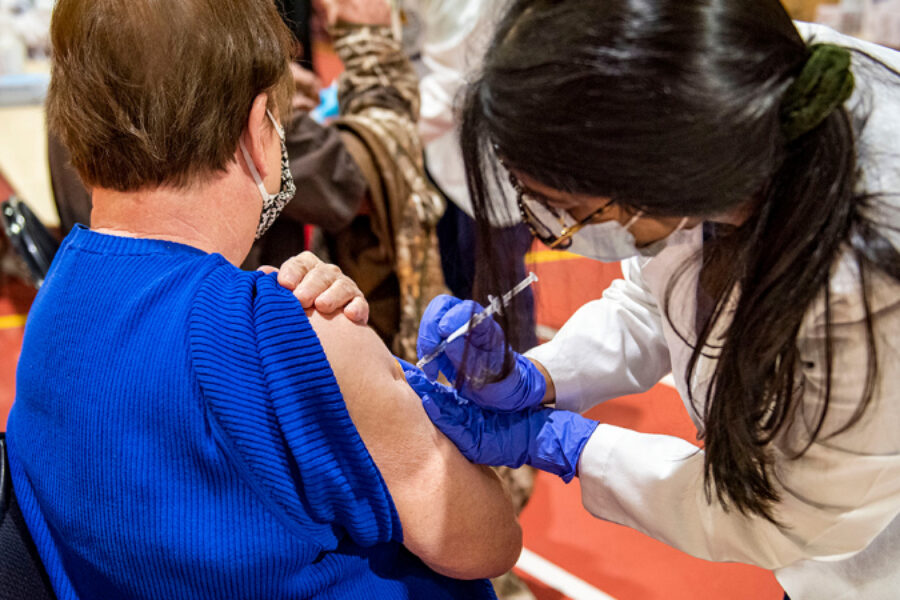
Serving Up Food Safety at Summer Barbecues
According to one recent survey, Americans typically attend four cookouts every summer. Some of those surveyed responded that they expect to attend five cookouts and host four of their own during this period.
Amid all of that fun and festivity, ensuring food safety needs to be a priority. When attending outdoor gatherings where food is often prepared by many people, how can guests and hosts alike ensure that food has been properly refrigerated, cooked, and stored before serving and consuming?
To tackle this topic, New York Tech News asked NYITCOM Associate Professor of Family and Sports Medicine Matthew Heller, D.O., for insight and guidance on how to recognize, treat, and prevent food poisoning as the outdoor eating season kicks into high gear ahead of Labor Day.
What are symptoms of food poisoning?
Food poisoning is a gastrointestinal infection that occurs after a person consumes contaminated food or drinks. It can be caused by bacteria, viruses, or parasites; food contamination is often caused by improper food storage, handling, or cooking.
The classic symptoms of food poisoning include nausea, vomiting, abdominal cramping, and fever. However, additional symptoms can develop due to loss of fluids. Symptoms of dehydration may include dizziness, lightheadedness, fatigue, dark urine, or feeling that you are going to pass out. Symptoms can develop within a few hours or weeks after exposure to ingesting contaminated foods. This depends on the type of pathogens involved.
How long do symptoms typically last?
In most cases, food poisoning will resolve after just a few days. In rare cases, it can last longer. Regardless, it’s important to stay hydrated, as the body needs to replenish fluids lost through vomiting and diarrhea.
How can one help minimize the resulting dehydration and try to recover from symptoms of food poisoning?
Replenish lost fluids and electrolytes, but use caution with sports drinks; the extra sugars may worsen symptoms by stimulating the bowels. Also, sports drinks may not accurately correct the electrolytes. If you use a sports drink, consider diluting it with water. Similarly, approach caffeinated beverages cautiously as they can also worsen symptoms by stimulating the bowel.
The amount of fluids needed per day to help recover will vary based on how much fluid has been lost. It is better to sip frequently to help reduce the symptoms of nausea. Look for symptoms of hydration status throughout the day. Darker urine will generally indicate dehydration, and waiting until you are thirsty is usually a sign you are already dehydrated. It’s better to be proactive and stay hydrated throughout the day by drinking fluids regularly, as tolerated.
Also, there is evidence that ginger can help reduce symptoms such as nausea and intestinal cramping. Use caution with ginger if you are on certain medications, as there may be interactions. Although consuming four grams of ginger per day is generally safe, most studies test the effectiveness using only one to two grams daily.
Is resting during recovery important?
When suffering from food poisoning, resting is healing! The body uses a lot of energy to fight off the illness. Resting allows one to focus on the healing process during the recovery. Any physical activity should be limited, as it may worsen the dehydration the body is experiencing. Resting can also reduce any feeling of nausea.
When is it time to consider seeing a doctor?
See a healthcare provider if signs of severe food poisoning develop (bloody diarrhea, persistent diarrhea for more than three days, inability to keep down any food or liquids, or fever greater than 102 degrees). Further, signs of dehydration such as lightheadedness, dizziness, excessive thirst, or decreased urine output should prompt a visit to a healthcare professional. If unable to hydrate on their own, sufferers may need help through fluids in an IV.
Is it possible to prevent this all in the first place?
Food poisoning can be prevented through various preventative measures. First, everyone needs to do their part in washing their hands before eating. Those preparing the food need to wash their hands before and after preparation. Also, when grilling, cook meats appropriately and at a safe temperature. Wash fruits and vegetables with running water before cooking or serving.
Avoid having leftover food sit out, especially in warm weather. Leftovers should be stored at a cold temperature if unable to place them in the refrigerator. Avoid cross-contamination by washing all previously used plates and utensils with soap and hot water before reusing, especially if they were previously used for raw meat, poultry, or seafood. Food meant to be served hot should be kept hot and not kept out for too long. Similarly, food meant to be served cold should be kept cold and not kept out for too long.
This interview has been edited and condensed.
More News

Celebrate Black History Month 2026
New York Tech celebrates Black History Month with a series of events.

Physician Responds to CDC Vaccine Schedule Changes
Family medicine physician Shane Speights, D.O., site dean for NYITCOM-Arkansas, weighs in on the new recommendations.

New York Tech Awarded $2.5 Million to Advance Civil Discourse on Campuses
New York Tech has received the U.S. Department of Education Fund for the Improvement of Postsecondary Education Special Projects Program Grant, which will support efforts to drive student success through building civil discourse across the university’s campuses.

Community Building
Working on the Institute for Public Architecture’s Modeling Community Visions for a Future Without the BQE project, Marcus Wilford (B. Arch. ’16) turned to his alma mater for support.

Intern Insight: Khushi Vasoya
Fashion and jewelry enthusiast Khushi Vasoya bridged that passion with her studies in business administration and finance while interning with LabGrown Box.

Winter Weather Safety 101
Shane Speights, D.O., site dean at NYITCOM-Arkansas, shares tips to stay warm, dry, and safe during the cold months.